Informal Learning in the Workplace: A Comprehensive Report
VerifiedAdded on 2020/05/16
|14
|3317
|841
Report
AI Summary
This report delves into the crucial role of informal learning within organizations. It begins by defining informal learning and contrasting it with formal learning, emphasizing its flexibility and reliance on social interaction and experience. The report provides a theoretical and conceptual framework, drawing on scholarly research to explore concepts like tacit knowledge, experiential learning, and incidental learning. It then outlines data sources and analysis methods, including qualitative data collection through observation and interviews. The discussion section highlights strategies for promoting informal learning in the workplace, such as learning through people, on-the-job learning, self-directed learning, job rotation, community involvement, and the use of technology. The report underscores the importance of informal learning in fostering employee development, skill acquisition, and organizational growth, concluding that it accounts for a significant portion of workplace learning and is essential for success in a rapidly changing environment.
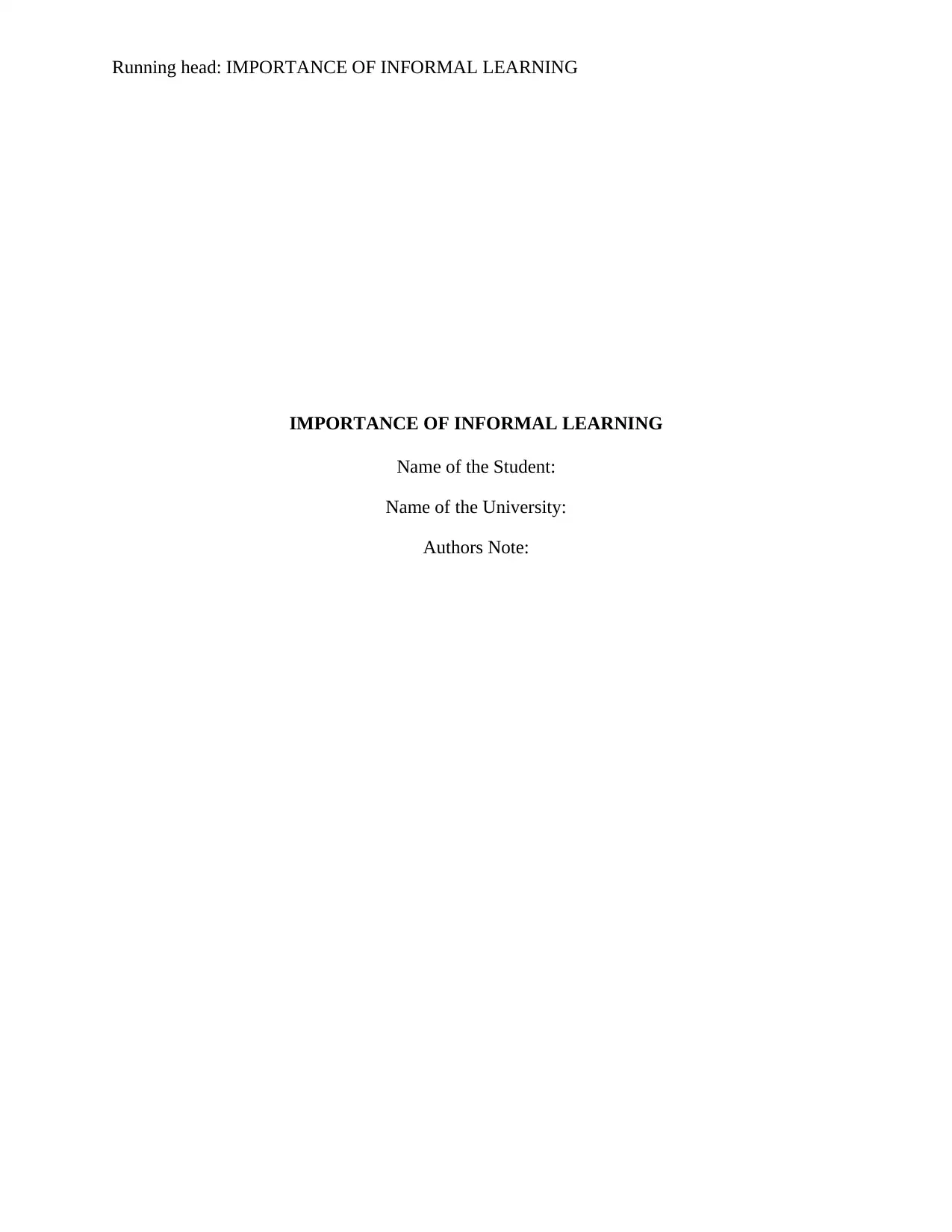
Running head: IMPORTANCE OF INFORMAL LEARNING
IMPORTANCE OF INFORMAL LEARNING
Name of the Student:
Name of the University:
Authors Note:
IMPORTANCE OF INFORMAL LEARNING
Name of the Student:
Name of the University:
Authors Note:
Paraphrase This Document
Need a fresh take? Get an instant paraphrase of this document with our AI Paraphraser
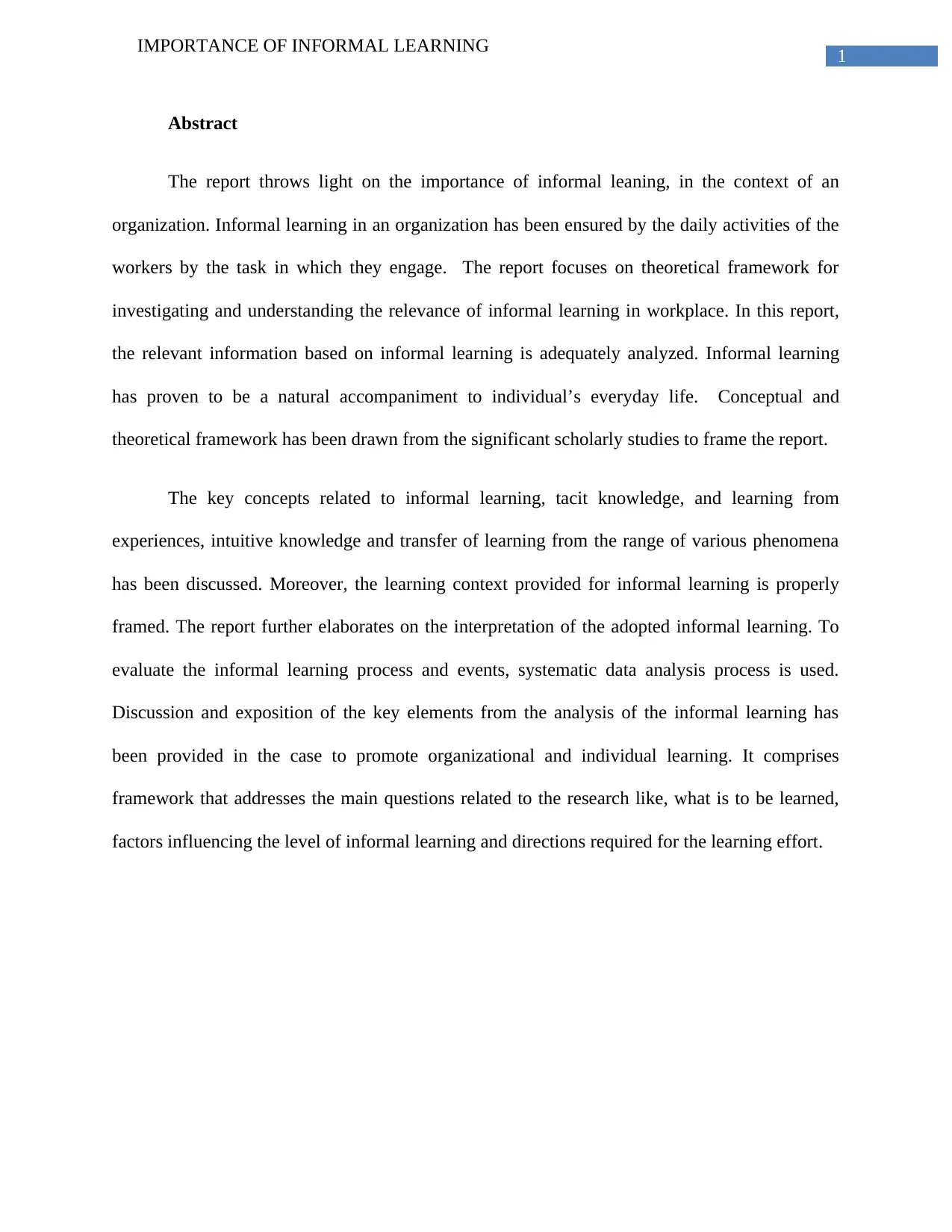
1
IMPORTANCE OF INFORMAL LEARNING
Abstract
The report throws light on the importance of informal leaning, in the context of an
organization. Informal learning in an organization has been ensured by the daily activities of the
workers by the task in which they engage. The report focuses on theoretical framework for
investigating and understanding the relevance of informal learning in workplace. In this report,
the relevant information based on informal learning is adequately analyzed. Informal learning
has proven to be a natural accompaniment to individual’s everyday life. Conceptual and
theoretical framework has been drawn from the significant scholarly studies to frame the report.
The key concepts related to informal learning, tacit knowledge, and learning from
experiences, intuitive knowledge and transfer of learning from the range of various phenomena
has been discussed. Moreover, the learning context provided for informal learning is properly
framed. The report further elaborates on the interpretation of the adopted informal learning. To
evaluate the informal learning process and events, systematic data analysis process is used.
Discussion and exposition of the key elements from the analysis of the informal learning has
been provided in the case to promote organizational and individual learning. It comprises
framework that addresses the main questions related to the research like, what is to be learned,
factors influencing the level of informal learning and directions required for the learning effort.
IMPORTANCE OF INFORMAL LEARNING
Abstract
The report throws light on the importance of informal leaning, in the context of an
organization. Informal learning in an organization has been ensured by the daily activities of the
workers by the task in which they engage. The report focuses on theoretical framework for
investigating and understanding the relevance of informal learning in workplace. In this report,
the relevant information based on informal learning is adequately analyzed. Informal learning
has proven to be a natural accompaniment to individual’s everyday life. Conceptual and
theoretical framework has been drawn from the significant scholarly studies to frame the report.
The key concepts related to informal learning, tacit knowledge, and learning from
experiences, intuitive knowledge and transfer of learning from the range of various phenomena
has been discussed. Moreover, the learning context provided for informal learning is properly
framed. The report further elaborates on the interpretation of the adopted informal learning. To
evaluate the informal learning process and events, systematic data analysis process is used.
Discussion and exposition of the key elements from the analysis of the informal learning has
been provided in the case to promote organizational and individual learning. It comprises
framework that addresses the main questions related to the research like, what is to be learned,
factors influencing the level of informal learning and directions required for the learning effort.
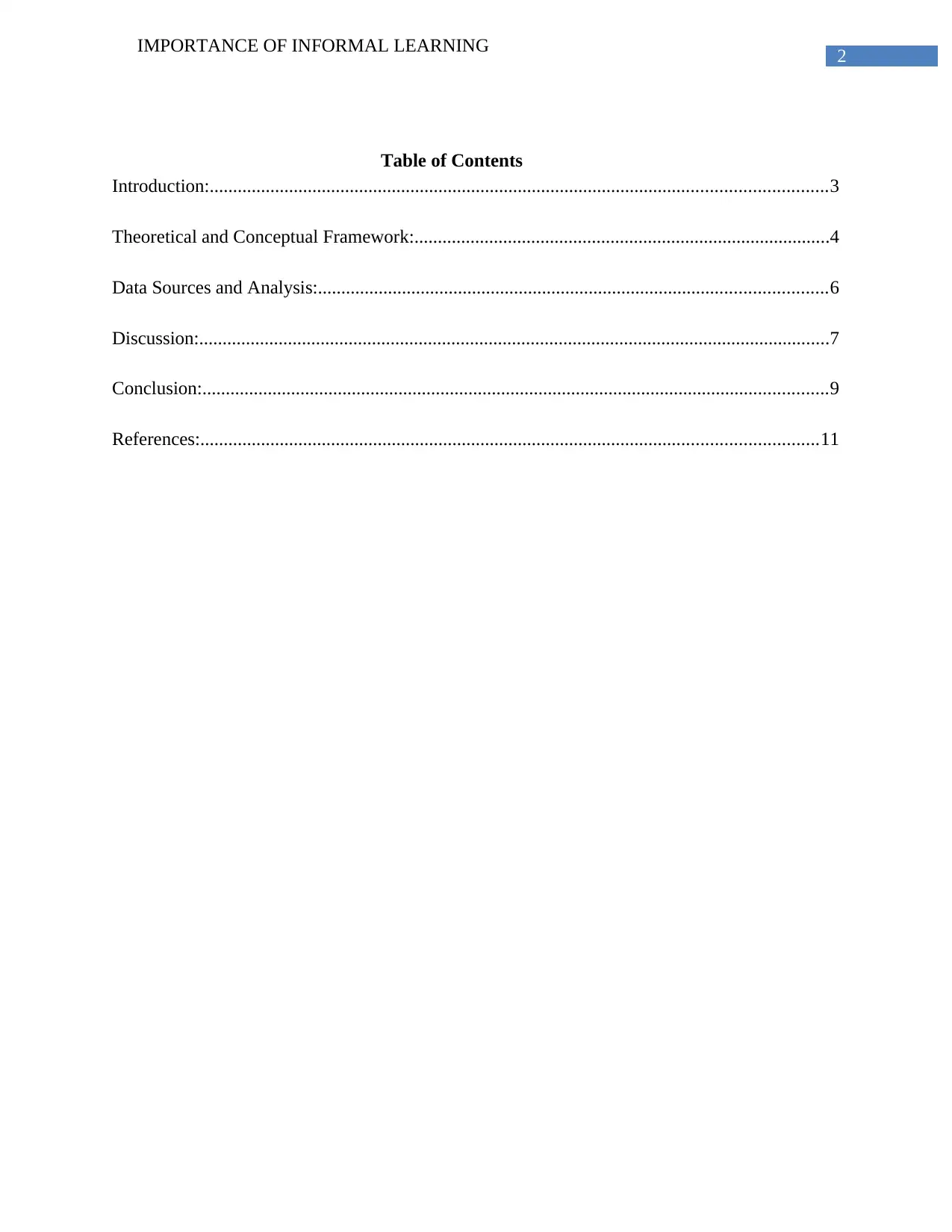
2
IMPORTANCE OF INFORMAL LEARNING
Table of Contents
Introduction:....................................................................................................................................3
Theoretical and Conceptual Framework:.........................................................................................4
Data Sources and Analysis:.............................................................................................................6
Discussion:.......................................................................................................................................7
Conclusion:......................................................................................................................................9
References:....................................................................................................................................11
IMPORTANCE OF INFORMAL LEARNING
Table of Contents
Introduction:....................................................................................................................................3
Theoretical and Conceptual Framework:.........................................................................................4
Data Sources and Analysis:.............................................................................................................6
Discussion:.......................................................................................................................................7
Conclusion:......................................................................................................................................9
References:....................................................................................................................................11
⊘ This is a preview!⊘
Do you want full access?
Subscribe today to unlock all pages.

Trusted by 1+ million students worldwide
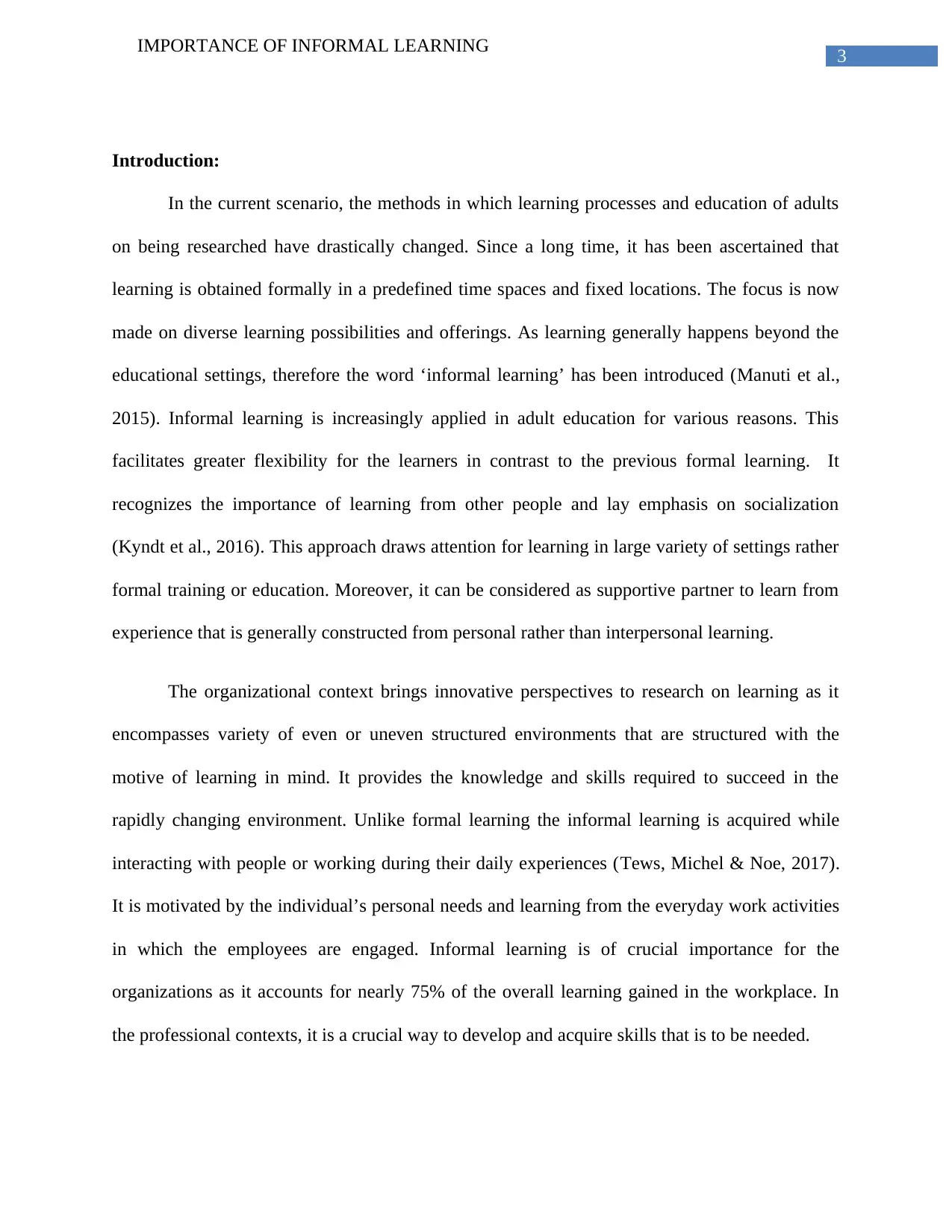
3
IMPORTANCE OF INFORMAL LEARNING
Introduction:
In the current scenario, the methods in which learning processes and education of adults
on being researched have drastically changed. Since a long time, it has been ascertained that
learning is obtained formally in a predefined time spaces and fixed locations. The focus is now
made on diverse learning possibilities and offerings. As learning generally happens beyond the
educational settings, therefore the word ‘informal learning’ has been introduced (Manuti et al.,
2015). Informal learning is increasingly applied in adult education for various reasons. This
facilitates greater flexibility for the learners in contrast to the previous formal learning. It
recognizes the importance of learning from other people and lay emphasis on socialization
(Kyndt et al., 2016). This approach draws attention for learning in large variety of settings rather
formal training or education. Moreover, it can be considered as supportive partner to learn from
experience that is generally constructed from personal rather than interpersonal learning.
The organizational context brings innovative perspectives to research on learning as it
encompasses variety of even or uneven structured environments that are structured with the
motive of learning in mind. It provides the knowledge and skills required to succeed in the
rapidly changing environment. Unlike formal learning the informal learning is acquired while
interacting with people or working during their daily experiences (Tews, Michel & Noe, 2017).
It is motivated by the individual’s personal needs and learning from the everyday work activities
in which the employees are engaged. Informal learning is of crucial importance for the
organizations as it accounts for nearly 75% of the overall learning gained in the workplace. In
the professional contexts, it is a crucial way to develop and acquire skills that is to be needed.
IMPORTANCE OF INFORMAL LEARNING
Introduction:
In the current scenario, the methods in which learning processes and education of adults
on being researched have drastically changed. Since a long time, it has been ascertained that
learning is obtained formally in a predefined time spaces and fixed locations. The focus is now
made on diverse learning possibilities and offerings. As learning generally happens beyond the
educational settings, therefore the word ‘informal learning’ has been introduced (Manuti et al.,
2015). Informal learning is increasingly applied in adult education for various reasons. This
facilitates greater flexibility for the learners in contrast to the previous formal learning. It
recognizes the importance of learning from other people and lay emphasis on socialization
(Kyndt et al., 2016). This approach draws attention for learning in large variety of settings rather
formal training or education. Moreover, it can be considered as supportive partner to learn from
experience that is generally constructed from personal rather than interpersonal learning.
The organizational context brings innovative perspectives to research on learning as it
encompasses variety of even or uneven structured environments that are structured with the
motive of learning in mind. It provides the knowledge and skills required to succeed in the
rapidly changing environment. Unlike formal learning the informal learning is acquired while
interacting with people or working during their daily experiences (Tews, Michel & Noe, 2017).
It is motivated by the individual’s personal needs and learning from the everyday work activities
in which the employees are engaged. Informal learning is of crucial importance for the
organizations as it accounts for nearly 75% of the overall learning gained in the workplace. In
the professional contexts, it is a crucial way to develop and acquire skills that is to be needed.
Paraphrase This Document
Need a fresh take? Get an instant paraphrase of this document with our AI Paraphraser
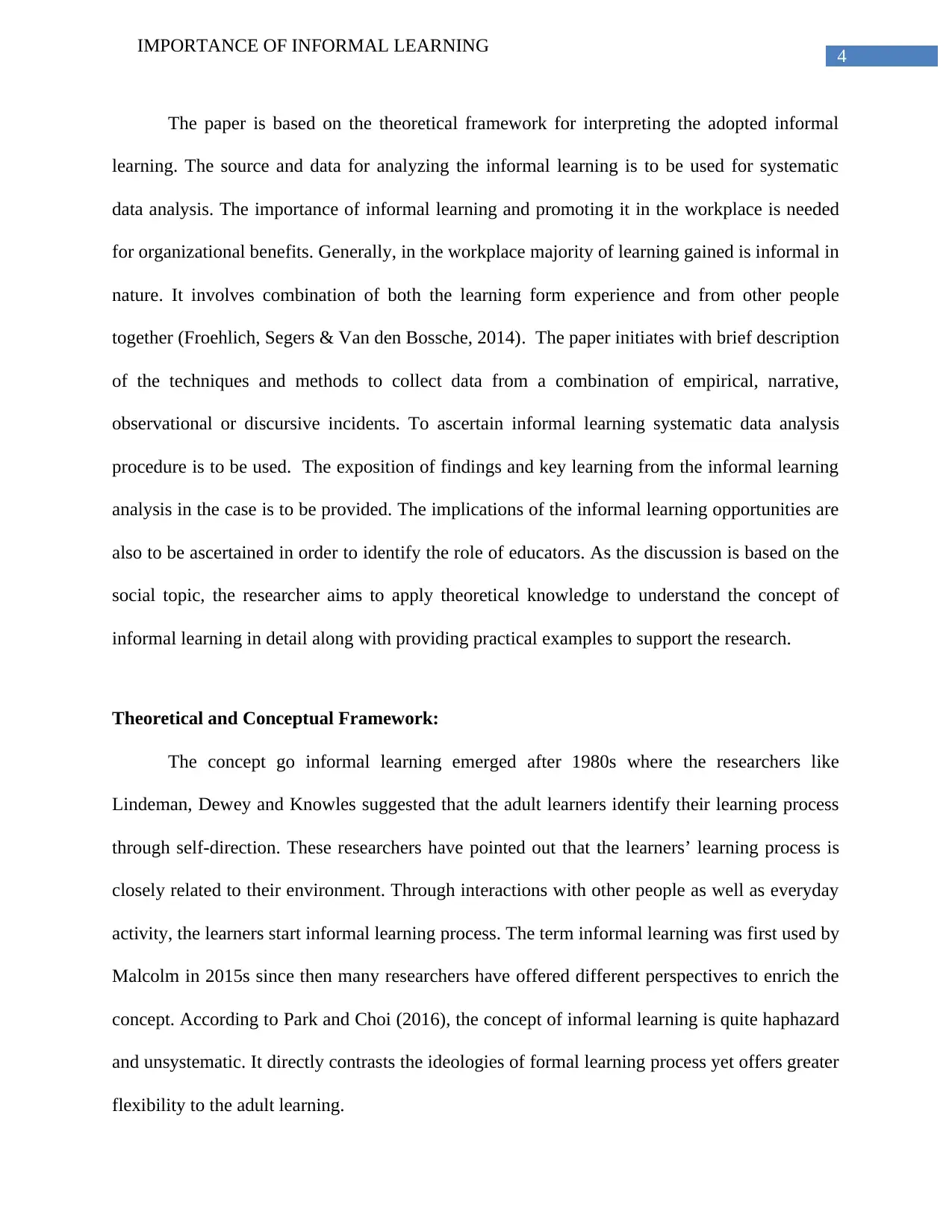
4
IMPORTANCE OF INFORMAL LEARNING
The paper is based on the theoretical framework for interpreting the adopted informal
learning. The source and data for analyzing the informal learning is to be used for systematic
data analysis. The importance of informal learning and promoting it in the workplace is needed
for organizational benefits. Generally, in the workplace majority of learning gained is informal in
nature. It involves combination of both the learning form experience and from other people
together (Froehlich, Segers & Van den Bossche, 2014). The paper initiates with brief description
of the techniques and methods to collect data from a combination of empirical, narrative,
observational or discursive incidents. To ascertain informal learning systematic data analysis
procedure is to be used. The exposition of findings and key learning from the informal learning
analysis in the case is to be provided. The implications of the informal learning opportunities are
also to be ascertained in order to identify the role of educators. As the discussion is based on the
social topic, the researcher aims to apply theoretical knowledge to understand the concept of
informal learning in detail along with providing practical examples to support the research.
Theoretical and Conceptual Framework:
The concept go informal learning emerged after 1980s where the researchers like
Lindeman, Dewey and Knowles suggested that the adult learners identify their learning process
through self-direction. These researchers have pointed out that the learners’ learning process is
closely related to their environment. Through interactions with other people as well as everyday
activity, the learners start informal learning process. The term informal learning was first used by
Malcolm in 2015s since then many researchers have offered different perspectives to enrich the
concept. According to Park and Choi (2016), the concept of informal learning is quite haphazard
and unsystematic. It directly contrasts the ideologies of formal learning process yet offers greater
flexibility to the adult learning.
IMPORTANCE OF INFORMAL LEARNING
The paper is based on the theoretical framework for interpreting the adopted informal
learning. The source and data for analyzing the informal learning is to be used for systematic
data analysis. The importance of informal learning and promoting it in the workplace is needed
for organizational benefits. Generally, in the workplace majority of learning gained is informal in
nature. It involves combination of both the learning form experience and from other people
together (Froehlich, Segers & Van den Bossche, 2014). The paper initiates with brief description
of the techniques and methods to collect data from a combination of empirical, narrative,
observational or discursive incidents. To ascertain informal learning systematic data analysis
procedure is to be used. The exposition of findings and key learning from the informal learning
analysis in the case is to be provided. The implications of the informal learning opportunities are
also to be ascertained in order to identify the role of educators. As the discussion is based on the
social topic, the researcher aims to apply theoretical knowledge to understand the concept of
informal learning in detail along with providing practical examples to support the research.
Theoretical and Conceptual Framework:
The concept go informal learning emerged after 1980s where the researchers like
Lindeman, Dewey and Knowles suggested that the adult learners identify their learning process
through self-direction. These researchers have pointed out that the learners’ learning process is
closely related to their environment. Through interactions with other people as well as everyday
activity, the learners start informal learning process. The term informal learning was first used by
Malcolm in 2015s since then many researchers have offered different perspectives to enrich the
concept. According to Park and Choi (2016), the concept of informal learning is quite haphazard
and unsystematic. It directly contrasts the ideologies of formal learning process yet offers greater
flexibility to the adult learning.
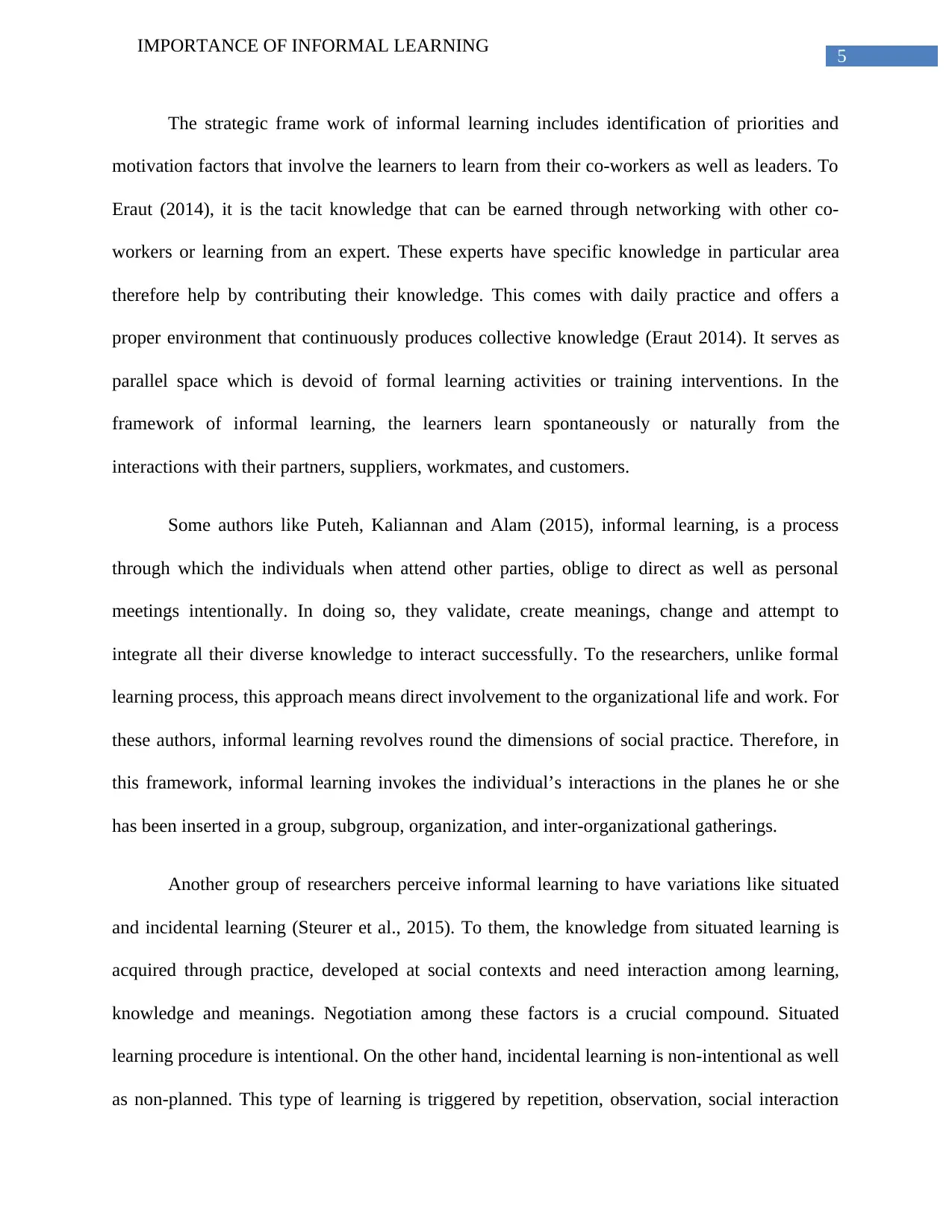
5
IMPORTANCE OF INFORMAL LEARNING
The strategic frame work of informal learning includes identification of priorities and
motivation factors that involve the learners to learn from their co-workers as well as leaders. To
Eraut (2014), it is the tacit knowledge that can be earned through networking with other co-
workers or learning from an expert. These experts have specific knowledge in particular area
therefore help by contributing their knowledge. This comes with daily practice and offers a
proper environment that continuously produces collective knowledge (Eraut 2014). It serves as
parallel space which is devoid of formal learning activities or training interventions. In the
framework of informal learning, the learners learn spontaneously or naturally from the
interactions with their partners, suppliers, workmates, and customers.
Some authors like Puteh, Kaliannan and Alam (2015), informal learning, is a process
through which the individuals when attend other parties, oblige to direct as well as personal
meetings intentionally. In doing so, they validate, create meanings, change and attempt to
integrate all their diverse knowledge to interact successfully. To the researchers, unlike formal
learning process, this approach means direct involvement to the organizational life and work. For
these authors, informal learning revolves round the dimensions of social practice. Therefore, in
this framework, informal learning invokes the individual’s interactions in the planes he or she
has been inserted in a group, subgroup, organization, and inter-organizational gatherings.
Another group of researchers perceive informal learning to have variations like situated
and incidental learning (Steurer et al., 2015). To them, the knowledge from situated learning is
acquired through practice, developed at social contexts and need interaction among learning,
knowledge and meanings. Negotiation among these factors is a crucial compound. Situated
learning procedure is intentional. On the other hand, incidental learning is non-intentional as well
as non-planned. This type of learning is triggered by repetition, observation, social interaction
IMPORTANCE OF INFORMAL LEARNING
The strategic frame work of informal learning includes identification of priorities and
motivation factors that involve the learners to learn from their co-workers as well as leaders. To
Eraut (2014), it is the tacit knowledge that can be earned through networking with other co-
workers or learning from an expert. These experts have specific knowledge in particular area
therefore help by contributing their knowledge. This comes with daily practice and offers a
proper environment that continuously produces collective knowledge (Eraut 2014). It serves as
parallel space which is devoid of formal learning activities or training interventions. In the
framework of informal learning, the learners learn spontaneously or naturally from the
interactions with their partners, suppliers, workmates, and customers.
Some authors like Puteh, Kaliannan and Alam (2015), informal learning, is a process
through which the individuals when attend other parties, oblige to direct as well as personal
meetings intentionally. In doing so, they validate, create meanings, change and attempt to
integrate all their diverse knowledge to interact successfully. To the researchers, unlike formal
learning process, this approach means direct involvement to the organizational life and work. For
these authors, informal learning revolves round the dimensions of social practice. Therefore, in
this framework, informal learning invokes the individual’s interactions in the planes he or she
has been inserted in a group, subgroup, organization, and inter-organizational gatherings.
Another group of researchers perceive informal learning to have variations like situated
and incidental learning (Steurer et al., 2015). To them, the knowledge from situated learning is
acquired through practice, developed at social contexts and need interaction among learning,
knowledge and meanings. Negotiation among these factors is a crucial compound. Situated
learning procedure is intentional. On the other hand, incidental learning is non-intentional as well
as non-planned. This type of learning is triggered by repetition, observation, social interaction
⊘ This is a preview!⊘
Do you want full access?
Subscribe today to unlock all pages.

Trusted by 1+ million students worldwide
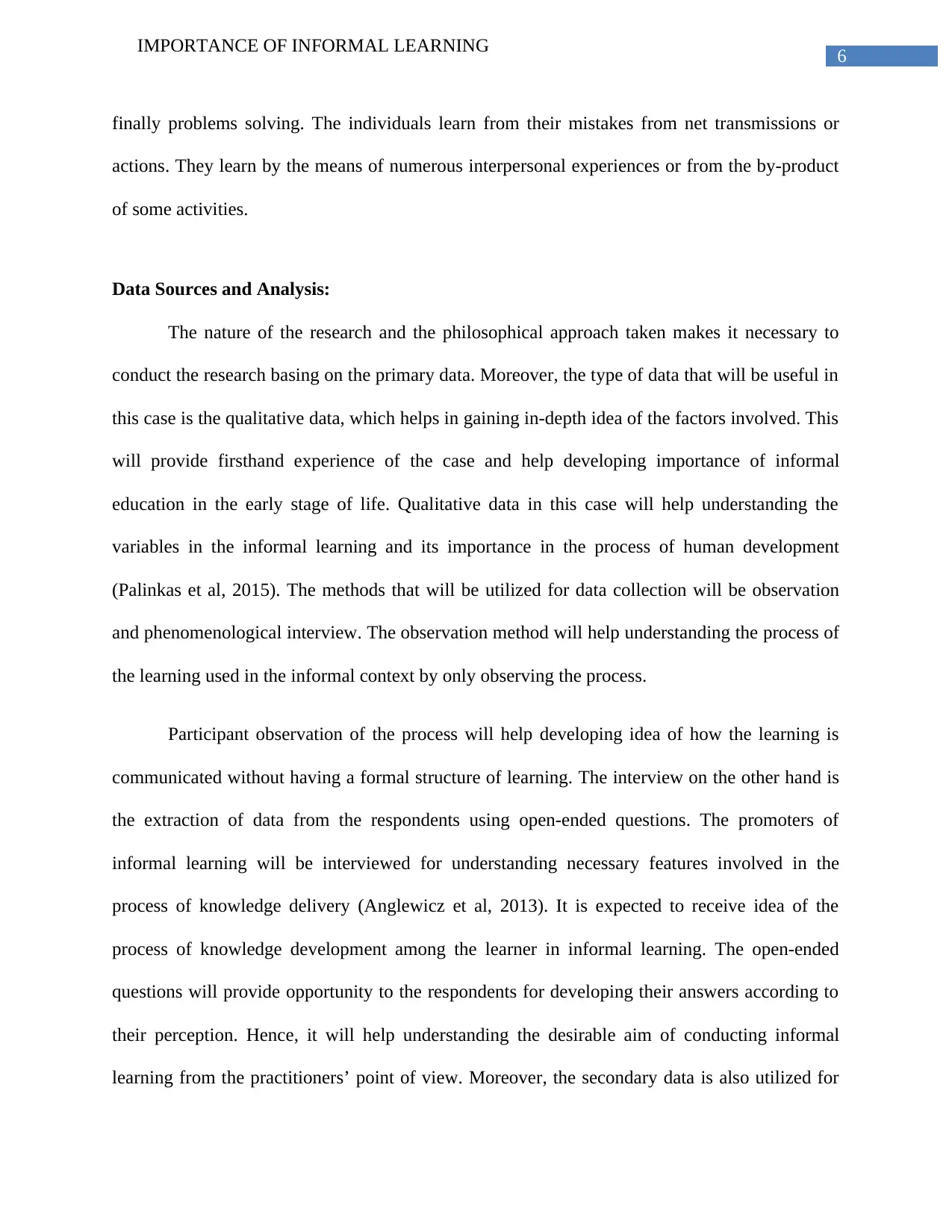
6
IMPORTANCE OF INFORMAL LEARNING
finally problems solving. The individuals learn from their mistakes from net transmissions or
actions. They learn by the means of numerous interpersonal experiences or from the by-product
of some activities.
Data Sources and Analysis:
The nature of the research and the philosophical approach taken makes it necessary to
conduct the research basing on the primary data. Moreover, the type of data that will be useful in
this case is the qualitative data, which helps in gaining in-depth idea of the factors involved. This
will provide firsthand experience of the case and help developing importance of informal
education in the early stage of life. Qualitative data in this case will help understanding the
variables in the informal learning and its importance in the process of human development
(Palinkas et al, 2015). The methods that will be utilized for data collection will be observation
and phenomenological interview. The observation method will help understanding the process of
the learning used in the informal context by only observing the process.
Participant observation of the process will help developing idea of how the learning is
communicated without having a formal structure of learning. The interview on the other hand is
the extraction of data from the respondents using open-ended questions. The promoters of
informal learning will be interviewed for understanding necessary features involved in the
process of knowledge delivery (Anglewicz et al, 2013). It is expected to receive idea of the
process of knowledge development among the learner in informal learning. The open-ended
questions will provide opportunity to the respondents for developing their answers according to
their perception. Hence, it will help understanding the desirable aim of conducting informal
learning from the practitioners’ point of view. Moreover, the secondary data is also utilized for
IMPORTANCE OF INFORMAL LEARNING
finally problems solving. The individuals learn from their mistakes from net transmissions or
actions. They learn by the means of numerous interpersonal experiences or from the by-product
of some activities.
Data Sources and Analysis:
The nature of the research and the philosophical approach taken makes it necessary to
conduct the research basing on the primary data. Moreover, the type of data that will be useful in
this case is the qualitative data, which helps in gaining in-depth idea of the factors involved. This
will provide firsthand experience of the case and help developing importance of informal
education in the early stage of life. Qualitative data in this case will help understanding the
variables in the informal learning and its importance in the process of human development
(Palinkas et al, 2015). The methods that will be utilized for data collection will be observation
and phenomenological interview. The observation method will help understanding the process of
the learning used in the informal context by only observing the process.
Participant observation of the process will help developing idea of how the learning is
communicated without having a formal structure of learning. The interview on the other hand is
the extraction of data from the respondents using open-ended questions. The promoters of
informal learning will be interviewed for understanding necessary features involved in the
process of knowledge delivery (Anglewicz et al, 2013). It is expected to receive idea of the
process of knowledge development among the learner in informal learning. The open-ended
questions will provide opportunity to the respondents for developing their answers according to
their perception. Hence, it will help understanding the desirable aim of conducting informal
learning from the practitioners’ point of view. Moreover, the secondary data is also utilized for
Paraphrase This Document
Need a fresh take? Get an instant paraphrase of this document with our AI Paraphraser
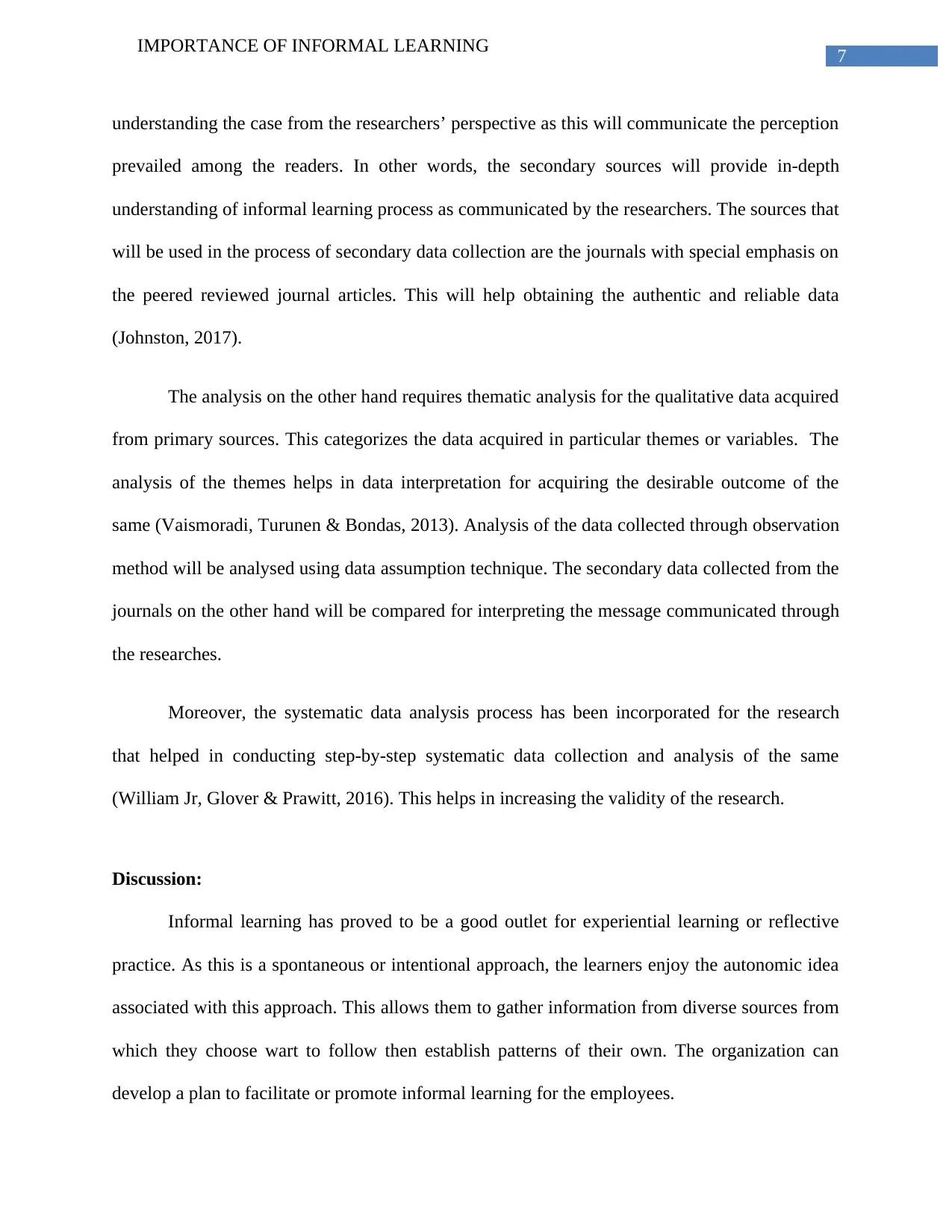
7
IMPORTANCE OF INFORMAL LEARNING
understanding the case from the researchers’ perspective as this will communicate the perception
prevailed among the readers. In other words, the secondary sources will provide in-depth
understanding of informal learning process as communicated by the researchers. The sources that
will be used in the process of secondary data collection are the journals with special emphasis on
the peered reviewed journal articles. This will help obtaining the authentic and reliable data
(Johnston, 2017).
The analysis on the other hand requires thematic analysis for the qualitative data acquired
from primary sources. This categorizes the data acquired in particular themes or variables. The
analysis of the themes helps in data interpretation for acquiring the desirable outcome of the
same (Vaismoradi, Turunen & Bondas, 2013). Analysis of the data collected through observation
method will be analysed using data assumption technique. The secondary data collected from the
journals on the other hand will be compared for interpreting the message communicated through
the researches.
Moreover, the systematic data analysis process has been incorporated for the research
that helped in conducting step-by-step systematic data collection and analysis of the same
(William Jr, Glover & Prawitt, 2016). This helps in increasing the validity of the research.
Discussion:
Informal learning has proved to be a good outlet for experiential learning or reflective
practice. As this is a spontaneous or intentional approach, the learners enjoy the autonomic idea
associated with this approach. This allows them to gather information from diverse sources from
which they choose wart to follow then establish patterns of their own. The organization can
develop a plan to facilitate or promote informal learning for the employees.
IMPORTANCE OF INFORMAL LEARNING
understanding the case from the researchers’ perspective as this will communicate the perception
prevailed among the readers. In other words, the secondary sources will provide in-depth
understanding of informal learning process as communicated by the researchers. The sources that
will be used in the process of secondary data collection are the journals with special emphasis on
the peered reviewed journal articles. This will help obtaining the authentic and reliable data
(Johnston, 2017).
The analysis on the other hand requires thematic analysis for the qualitative data acquired
from primary sources. This categorizes the data acquired in particular themes or variables. The
analysis of the themes helps in data interpretation for acquiring the desirable outcome of the
same (Vaismoradi, Turunen & Bondas, 2013). Analysis of the data collected through observation
method will be analysed using data assumption technique. The secondary data collected from the
journals on the other hand will be compared for interpreting the message communicated through
the researches.
Moreover, the systematic data analysis process has been incorporated for the research
that helped in conducting step-by-step systematic data collection and analysis of the same
(William Jr, Glover & Prawitt, 2016). This helps in increasing the validity of the research.
Discussion:
Informal learning has proved to be a good outlet for experiential learning or reflective
practice. As this is a spontaneous or intentional approach, the learners enjoy the autonomic idea
associated with this approach. This allows them to gather information from diverse sources from
which they choose wart to follow then establish patterns of their own. The organization can
develop a plan to facilitate or promote informal learning for the employees.
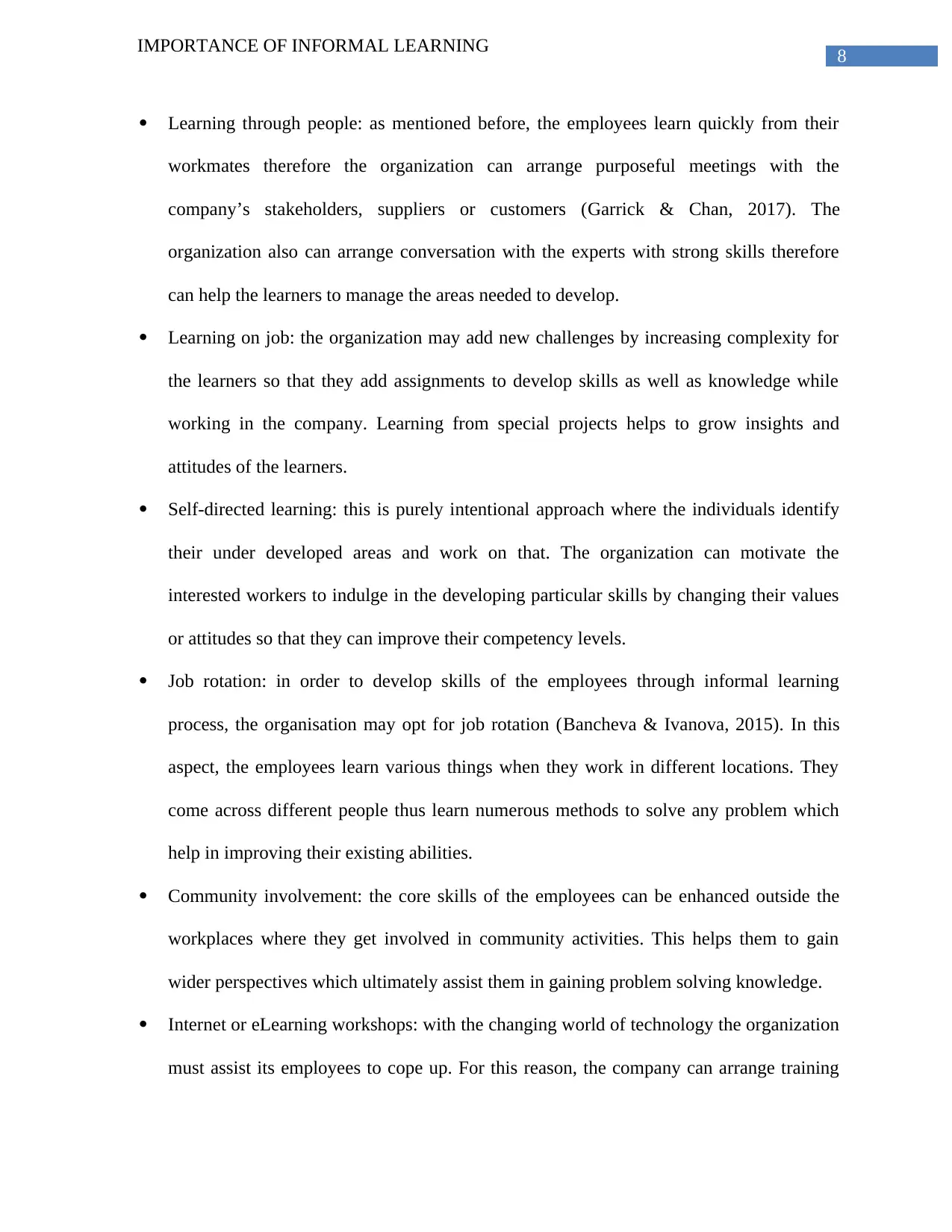
8
IMPORTANCE OF INFORMAL LEARNING
Learning through people: as mentioned before, the employees learn quickly from their
workmates therefore the organization can arrange purposeful meetings with the
company’s stakeholders, suppliers or customers (Garrick & Chan, 2017). The
organization also can arrange conversation with the experts with strong skills therefore
can help the learners to manage the areas needed to develop.
Learning on job: the organization may add new challenges by increasing complexity for
the learners so that they add assignments to develop skills as well as knowledge while
working in the company. Learning from special projects helps to grow insights and
attitudes of the learners.
Self-directed learning: this is purely intentional approach where the individuals identify
their under developed areas and work on that. The organization can motivate the
interested workers to indulge in the developing particular skills by changing their values
or attitudes so that they can improve their competency levels.
Job rotation: in order to develop skills of the employees through informal learning
process, the organisation may opt for job rotation (Bancheva & Ivanova, 2015). In this
aspect, the employees learn various things when they work in different locations. They
come across different people thus learn numerous methods to solve any problem which
help in improving their existing abilities.
Community involvement: the core skills of the employees can be enhanced outside the
workplaces where they get involved in community activities. This helps them to gain
wider perspectives which ultimately assist them in gaining problem solving knowledge.
Internet or eLearning workshops: with the changing world of technology the organization
must assist its employees to cope up. For this reason, the company can arrange training
IMPORTANCE OF INFORMAL LEARNING
Learning through people: as mentioned before, the employees learn quickly from their
workmates therefore the organization can arrange purposeful meetings with the
company’s stakeholders, suppliers or customers (Garrick & Chan, 2017). The
organization also can arrange conversation with the experts with strong skills therefore
can help the learners to manage the areas needed to develop.
Learning on job: the organization may add new challenges by increasing complexity for
the learners so that they add assignments to develop skills as well as knowledge while
working in the company. Learning from special projects helps to grow insights and
attitudes of the learners.
Self-directed learning: this is purely intentional approach where the individuals identify
their under developed areas and work on that. The organization can motivate the
interested workers to indulge in the developing particular skills by changing their values
or attitudes so that they can improve their competency levels.
Job rotation: in order to develop skills of the employees through informal learning
process, the organisation may opt for job rotation (Bancheva & Ivanova, 2015). In this
aspect, the employees learn various things when they work in different locations. They
come across different people thus learn numerous methods to solve any problem which
help in improving their existing abilities.
Community involvement: the core skills of the employees can be enhanced outside the
workplaces where they get involved in community activities. This helps them to gain
wider perspectives which ultimately assist them in gaining problem solving knowledge.
Internet or eLearning workshops: with the changing world of technology the organization
must assist its employees to cope up. For this reason, the company can arrange training
⊘ This is a preview!⊘
Do you want full access?
Subscribe today to unlock all pages.

Trusted by 1+ million students worldwide
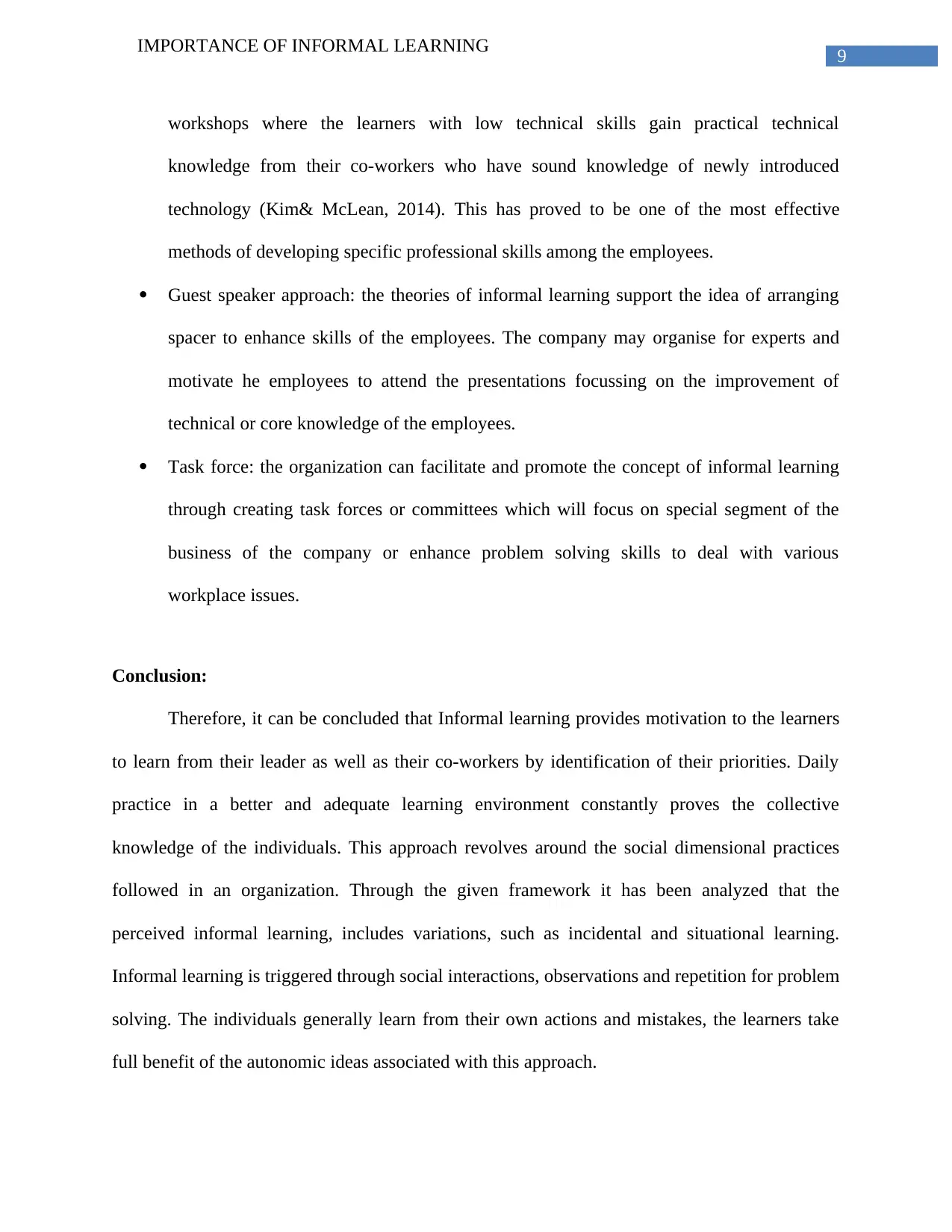
9
IMPORTANCE OF INFORMAL LEARNING
workshops where the learners with low technical skills gain practical technical
knowledge from their co-workers who have sound knowledge of newly introduced
technology (Kim& McLean, 2014). This has proved to be one of the most effective
methods of developing specific professional skills among the employees.
Guest speaker approach: the theories of informal learning support the idea of arranging
spacer to enhance skills of the employees. The company may organise for experts and
motivate he employees to attend the presentations focussing on the improvement of
technical or core knowledge of the employees.
Task force: the organization can facilitate and promote the concept of informal learning
through creating task forces or committees which will focus on special segment of the
business of the company or enhance problem solving skills to deal with various
workplace issues.
Conclusion:
Therefore, it can be concluded that Informal learning provides motivation to the learners
to learn from their leader as well as their co-workers by identification of their priorities. Daily
practice in a better and adequate learning environment constantly proves the collective
knowledge of the individuals. This approach revolves around the social dimensional practices
followed in an organization. Through the given framework it has been analyzed that the
perceived informal learning, includes variations, such as incidental and situational learning.
Informal learning is triggered through social interactions, observations and repetition for problem
solving. The individuals generally learn from their own actions and mistakes, the learners take
full benefit of the autonomic ideas associated with this approach.
IMPORTANCE OF INFORMAL LEARNING
workshops where the learners with low technical skills gain practical technical
knowledge from their co-workers who have sound knowledge of newly introduced
technology (Kim& McLean, 2014). This has proved to be one of the most effective
methods of developing specific professional skills among the employees.
Guest speaker approach: the theories of informal learning support the idea of arranging
spacer to enhance skills of the employees. The company may organise for experts and
motivate he employees to attend the presentations focussing on the improvement of
technical or core knowledge of the employees.
Task force: the organization can facilitate and promote the concept of informal learning
through creating task forces or committees which will focus on special segment of the
business of the company or enhance problem solving skills to deal with various
workplace issues.
Conclusion:
Therefore, it can be concluded that Informal learning provides motivation to the learners
to learn from their leader as well as their co-workers by identification of their priorities. Daily
practice in a better and adequate learning environment constantly proves the collective
knowledge of the individuals. This approach revolves around the social dimensional practices
followed in an organization. Through the given framework it has been analyzed that the
perceived informal learning, includes variations, such as incidental and situational learning.
Informal learning is triggered through social interactions, observations and repetition for problem
solving. The individuals generally learn from their own actions and mistakes, the learners take
full benefit of the autonomic ideas associated with this approach.
Paraphrase This Document
Need a fresh take? Get an instant paraphrase of this document with our AI Paraphraser
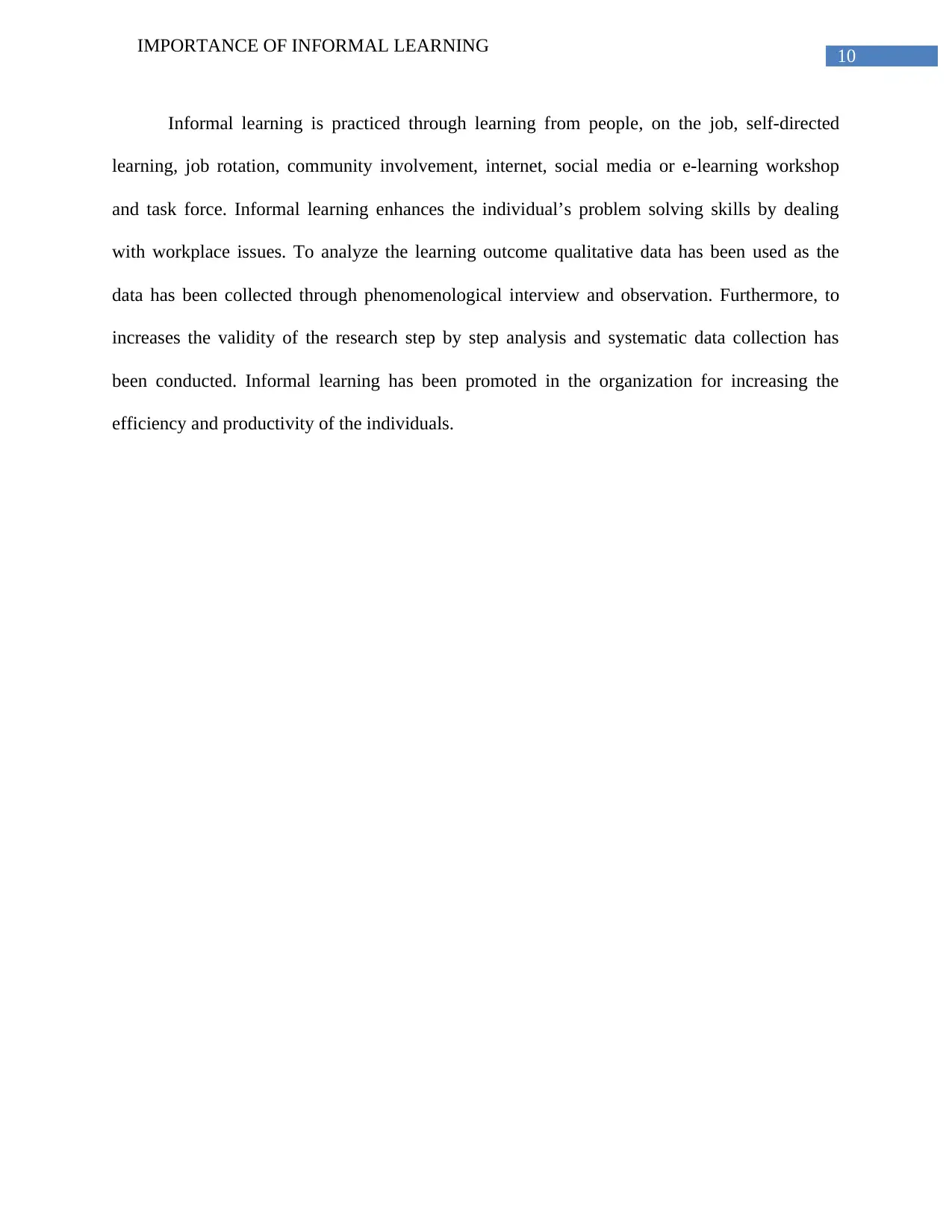
10
IMPORTANCE OF INFORMAL LEARNING
Informal learning is practiced through learning from people, on the job, self-directed
learning, job rotation, community involvement, internet, social media or e-learning workshop
and task force. Informal learning enhances the individual’s problem solving skills by dealing
with workplace issues. To analyze the learning outcome qualitative data has been used as the
data has been collected through phenomenological interview and observation. Furthermore, to
increases the validity of the research step by step analysis and systematic data collection has
been conducted. Informal learning has been promoted in the organization for increasing the
efficiency and productivity of the individuals.
IMPORTANCE OF INFORMAL LEARNING
Informal learning is practiced through learning from people, on the job, self-directed
learning, job rotation, community involvement, internet, social media or e-learning workshop
and task force. Informal learning enhances the individual’s problem solving skills by dealing
with workplace issues. To analyze the learning outcome qualitative data has been used as the
data has been collected through phenomenological interview and observation. Furthermore, to
increases the validity of the research step by step analysis and systematic data collection has
been conducted. Informal learning has been promoted in the organization for increasing the
efficiency and productivity of the individuals.
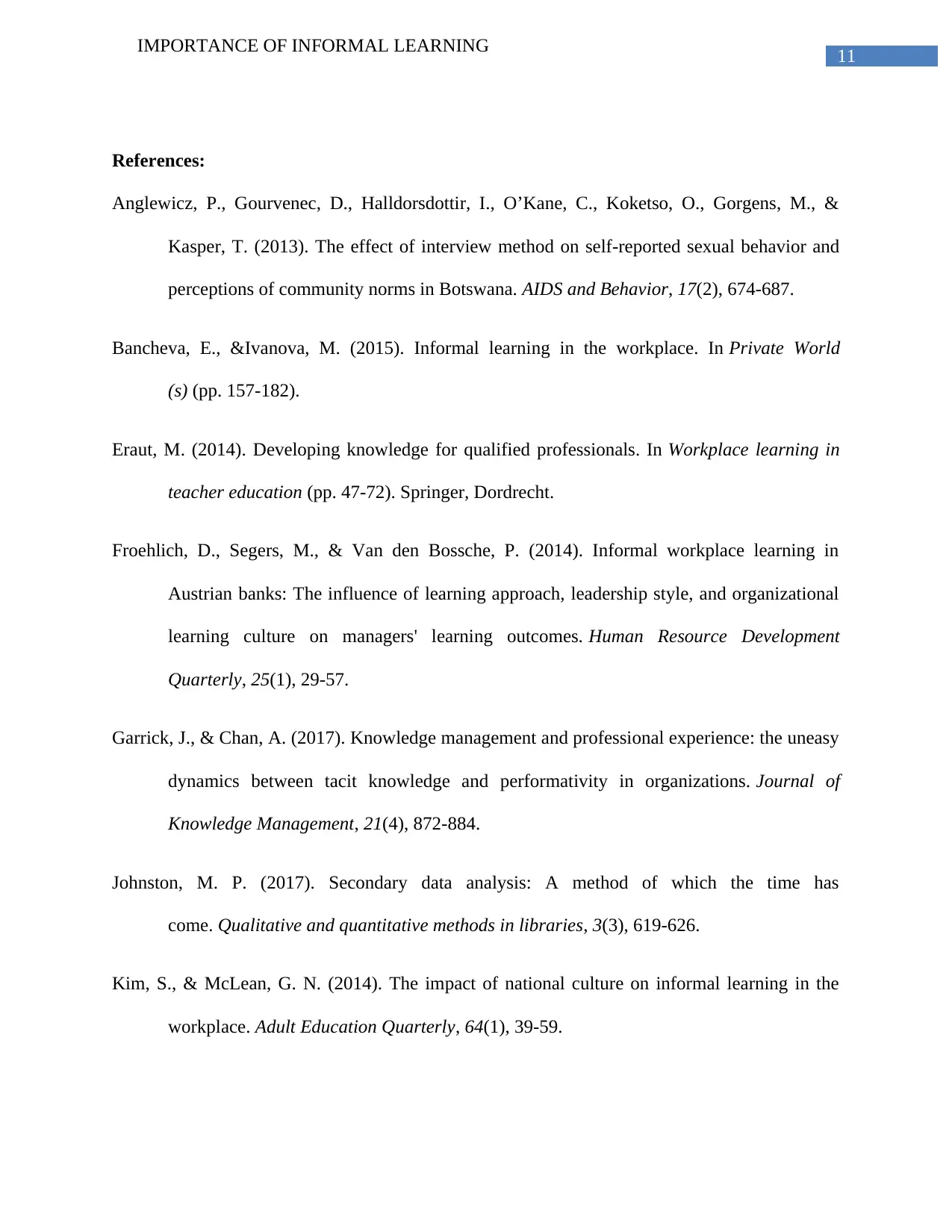
11
IMPORTANCE OF INFORMAL LEARNING
References:
Anglewicz, P., Gourvenec, D., Halldorsdottir, I., O’Kane, C., Koketso, O., Gorgens, M., &
Kasper, T. (2013). The effect of interview method on self-reported sexual behavior and
perceptions of community norms in Botswana. AIDS and Behavior, 17(2), 674-687.
Bancheva, E., &Ivanova, M. (2015). Informal learning in the workplace. In Private World
(s) (pp. 157-182).
Eraut, M. (2014). Developing knowledge for qualified professionals. In Workplace learning in
teacher education (pp. 47-72). Springer, Dordrecht.
Froehlich, D., Segers, M., & Van den Bossche, P. (2014). Informal workplace learning in
Austrian banks: The influence of learning approach, leadership style, and organizational
learning culture on managers' learning outcomes. Human Resource Development
Quarterly, 25(1), 29-57.
Garrick, J., & Chan, A. (2017). Knowledge management and professional experience: the uneasy
dynamics between tacit knowledge and performativity in organizations. Journal of
Knowledge Management, 21(4), 872-884.
Johnston, M. P. (2017). Secondary data analysis: A method of which the time has
come. Qualitative and quantitative methods in libraries, 3(3), 619-626.
Kim, S., & McLean, G. N. (2014). The impact of national culture on informal learning in the
workplace. Adult Education Quarterly, 64(1), 39-59.
IMPORTANCE OF INFORMAL LEARNING
References:
Anglewicz, P., Gourvenec, D., Halldorsdottir, I., O’Kane, C., Koketso, O., Gorgens, M., &
Kasper, T. (2013). The effect of interview method on self-reported sexual behavior and
perceptions of community norms in Botswana. AIDS and Behavior, 17(2), 674-687.
Bancheva, E., &Ivanova, M. (2015). Informal learning in the workplace. In Private World
(s) (pp. 157-182).
Eraut, M. (2014). Developing knowledge for qualified professionals. In Workplace learning in
teacher education (pp. 47-72). Springer, Dordrecht.
Froehlich, D., Segers, M., & Van den Bossche, P. (2014). Informal workplace learning in
Austrian banks: The influence of learning approach, leadership style, and organizational
learning culture on managers' learning outcomes. Human Resource Development
Quarterly, 25(1), 29-57.
Garrick, J., & Chan, A. (2017). Knowledge management and professional experience: the uneasy
dynamics between tacit knowledge and performativity in organizations. Journal of
Knowledge Management, 21(4), 872-884.
Johnston, M. P. (2017). Secondary data analysis: A method of which the time has
come. Qualitative and quantitative methods in libraries, 3(3), 619-626.
Kim, S., & McLean, G. N. (2014). The impact of national culture on informal learning in the
workplace. Adult Education Quarterly, 64(1), 39-59.
⊘ This is a preview!⊘
Do you want full access?
Subscribe today to unlock all pages.

Trusted by 1+ million students worldwide
1 out of 14
Related Documents
Your All-in-One AI-Powered Toolkit for Academic Success.
+13062052269
info@desklib.com
Available 24*7 on WhatsApp / Email
![[object Object]](/_next/static/media/star-bottom.7253800d.svg)
Unlock your academic potential
Copyright © 2020–2026 A2Z Services. All Rights Reserved. Developed and managed by ZUCOL.





